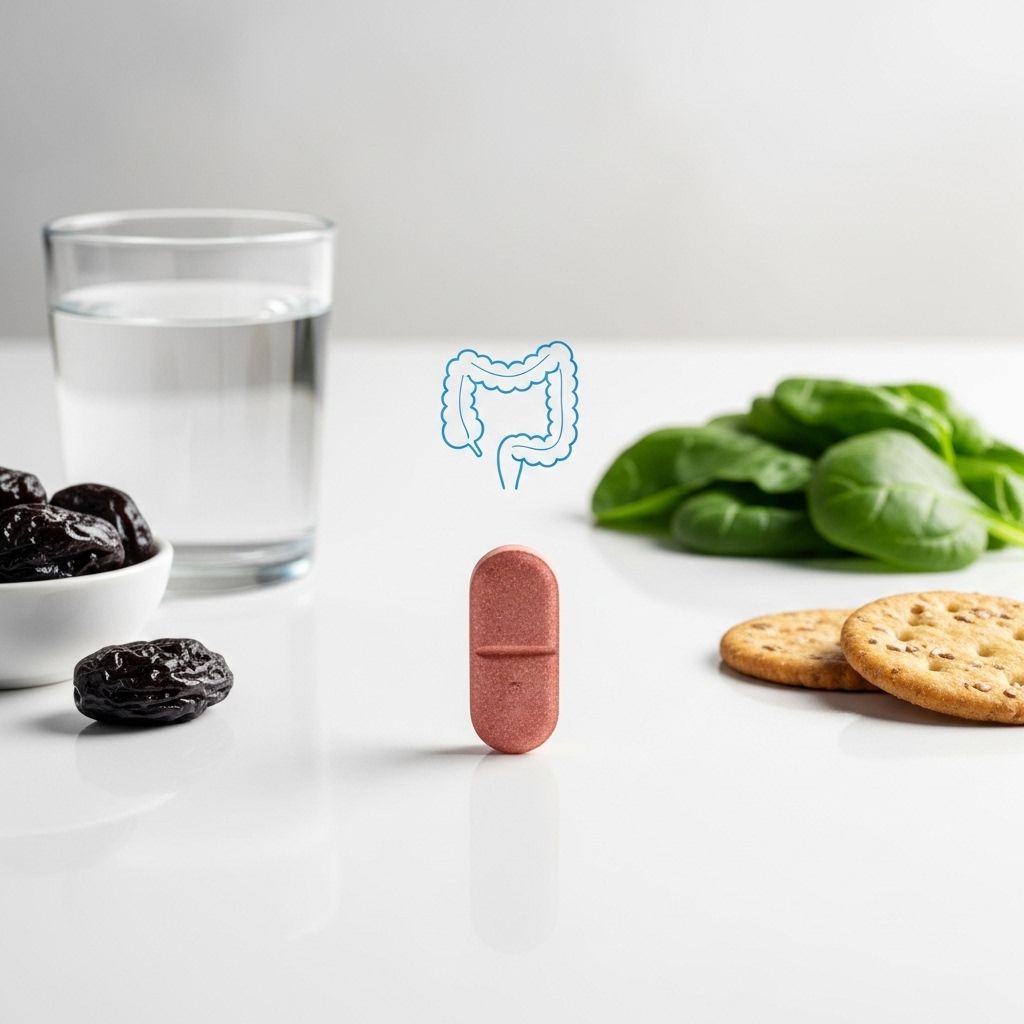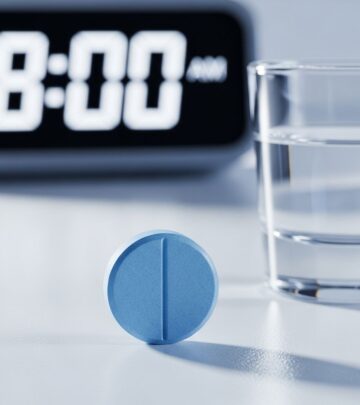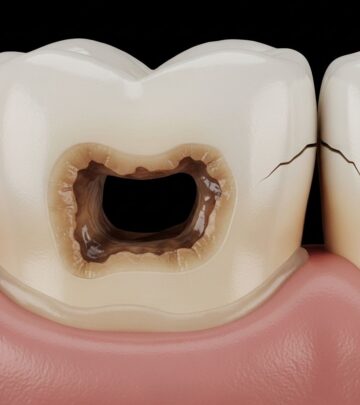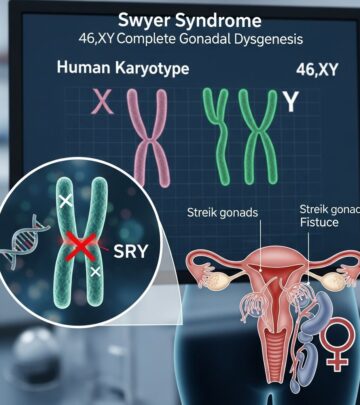How to Prevent Constipation When Taking Iron Tablets
Reduce iron supplement constipation with smart diet, hydration, and medication tips to keep your digestion healthy.

Iron deficiency is a widespread health concern and iron tablets are commonly prescribed or recommended over the counter for those who need to boost their iron levels. However, while these supplements are effective in treating iron deficiency and anemia, they are also known for an unpleasant and frequent side effect: constipation. Understanding why this happens and how you can prevent or manage it is crucial for your digestive and overall health.
Why Iron Tablets Cause Constipation
Iron supplements—especially those containing ferrous sulfate—are highly effective in treating iron deficiency anemia because they provide a concentrated dose of iron that is easily absorbed by the body. However, taking these supplements can result in gastrointestinal side effects for many people, notably constipation, abdominal discomfort, and bloating. Research suggests that up to 60% of people who take oral iron supplements experience some form of GI side effect, with constipation being among the most common.
The mechanism is still under investigation, but experts believe excess unabsorbed iron remains in the digestive tract, disrupting the gut environment and leading to harder stools. Iron supplements may also alter gut bacteria and reduce the movement of water into the colon, causing stools to dry out and harden.
Who Is Most at Risk for Constipation from Iron?
- People who are sensitive to changes in digestion.
- Older adults, who may have slower gut motility.
- Pregnant women on prenatal iron supplements.
- Individuals taking high-dose or multiple medications known to affect bowel habits.
- Those who already have a history of chronic or occasional constipation.
Take extra precautions if you belong to one of these groups, and speak to your healthcare provider before starting iron therapy.
Tips to Prevent and Manage Constipation from Iron Tablets
While iron-induced constipation is common, you do not have to just accept it. Here’s how to minimize or prevent it while still getting the iron your body needs:
1. Increase Dietary Fiber
Fiber adds bulk to your stool and promotes regular bowel movements. It’s particularly beneficial for those experiencing constipation due to iron supplements. Aim for a diet rich in:
- Vegetables: Broccoli, carrots, leafy greens (spinach, kale, collards)
- Fruits: Apples, pears, berries, prunes
- Whole grains: Oatmeal, brown rice, whole wheat bread and pasta
- Legumes: Lentils, beans, chickpeas
- Nuts and seeds
Gradually increase fiber intake to avoid gas and bloating. Most adults need about 25-35 grams of fiber per day.
2. Drink Plenty of Fluids
Staying hydrated keeps your digestive system working smoothly and helps keep stools soft. Water is best, but clear broths, herbal teas, and diluted juices also count. Try to drink at least 8 cups (2 liters) of fluids a day, more if you are physically active or live in a hot climate.
3. Stay Physically Active
Exercise stimulates bowel activity and helps speed up intestinal movement. Aim for at least 30 minutes of moderate physical activity most days, such as brisk walking, cycling, or swimming. Even basic daily movement—like gentle stretching—can make a difference.
4. Adjust the Timing and Dosage of Iron Tablets
Ask your healthcare provider if it’s possible to:
- Take your iron on alternate days (every other day) instead of daily, as recent research shows this may improve absorption and reduce side effects for some people.
- Switch to a lower dose to see if you tolerate it better, then increase gradually if needed.
- Consider a different form of iron that may be gentler on your stomach, such as ferrous gluconate or ferric iron sources (which tend to have fewer GI side effects than ferrous sulfate).
5. Take Iron Tablets with or After Meals
Iron is best absorbed on an empty stomach, but taking your supplement with a small amount of food can help reduce constipation and other gastrointestinal discomfort. Avoid taking iron with calcium-rich foods (dairy) or with coffee or tea, as these can reduce absorption. Instead, combine with vitamin C-rich foods (like oranges or bell peppers) for better absorption.
6. Avoid Highly Processed Foods
Processed foods are often low in fiber and high in sugar or fat, which can aggravate constipation. Minimize intake of:
- Fast food and fried snacks
- Processed meats and cheeses
- Baked goods made with white flour (like pastries, doughnuts, and cookies)
7. Consider Stool Softeners or Laxatives
If lifestyle measures do not provide relief, your healthcare provider may suggest:
- Stool softeners (e.g., docusate sodium)
- Osmotic agents (e.g., polyethylene glycol, milk of magnesia)
- Fiber supplements (e.g., psyllium powder, methylcellulose)
- Lubricant laxatives (e.g., mineral oil)
- Stimulant laxatives (e.g., senna, bisacodyl), which should be used only short-term
Always check with your healthcare provider before starting any OTC medication or supplement, as these may interact with your iron therapy or other prescription drugs.
8. Try Bowel Training
Encourage regular bowel movements by going to the bathroom at the same time every day—often 15 to 45 minutes after a meal, like breakfast—when the body’s natural urge to have a bowel movement is strongest. Do not rush; allow yourself time for a complete bowel movement.
When to Contact Your Healthcare Provider
If you experience any of the following while taking iron tablets, contact your doctor promptly:
- Constipation that persists longer than a week despite home remedies
- Severe abdominal pain or bloating
- Blood in your stool
- Nausea, vomiting, or inability to keep food or fluids down
- Black, tarry stools (though dark stools may be a benign side effect of iron, if in doubt contact your doctor)
- Signs of intestinal blockage (no bowel movement or gas for several days)
Some individuals have conditions (such as hemochromatosis, inflammatory bowel disease, or previous significant digestive surgery) that make iron supplementation riskier. Never start or adjust iron doses without medical advice.
Iron Supplement Safety: Dosage, Forms, and Side Effects
There are many kinds of iron supplements. Some common forms include:
| Iron Type | Common Brand Names | Relative Stool Side Effects |
|---|---|---|
| Ferrous Sulfate | Feosol, Fer-In-Sol | Higher risk of constipation |
| Ferrous Gluconate | Fergon | Moderate |
| Ferrous Fumarate | Hemocyte, Ferretts | Moderate to high |
| Polysaccharide-iron complex | Niferex, Ferrex | Lower risk of constipation |
| Ferric Iron Salts | Various brands | Lower |
Only your doctor can determine the best type and dose of iron supplement for your needs. Too much iron is toxic, and high doses—especially for children—can be very dangerous.
Additional Practical Tips for Comfortable Iron Supplementation
- Monitor how your stool changes after starting iron and discuss persistent issues with your doctor.
- Keep a food and symptom diary for a week to help identify patterns and triggers.
- Space your iron supplement at least two hours apart from calcium or other mineral supplements, which can impact absorption.
- Pair iron with vitamin C (from citrus or vegetables) to boost absorption naturally.
- If taking iron makes you nauseous or causes other side effects, ask if a slow-release preparation or liquid form is suitable for you.
Frequently Asked Questions (FAQs)
Q: Can I prevent constipation entirely if I have to take iron tablets?
A: Not everyone will experience constipation from iron tablets, but for those who do, following dietary, hydration, and activity advice can dramatically reduce your risk. If you’re prone to constipation, regular check-ins with your healthcare provider will help you manage symptoms early on.
Q: Should I stop taking iron if I become constipated?
A: Never discontinue prescribed iron supplements without consulting your doctor. Your provider can help you adjust the form, dose, or timing or suggest remedies to make iron supplementation more tolerable and safer.
Q: How long does it take for iron tablets to cause constipation?
A: Constipation symptoms usually appear within several days to a week after starting iron tablets. For some, symptoms may develop sooner or take longer based on individual gut motility, diet, and fluid intake.
Q: Can vitamin C help with iron-induced constipation?
A: Vitamin C improves iron absorption but does not directly prevent constipation. However, combining iron supplements with vitamin C-rich foods may allow you to take a lower dose with the same benefit, potentially reducing constipation risk.
Q: Are there any medical treatments specifically for iron-induced constipation?
A: Yes, your provider may recommend stool softeners, osmotic or bulk-forming laxatives, or, rarely, prescription medications if constipation does not resolve with diet and lifestyle changes. Discuss options with your doctor, especially if you have other medical conditions or take multiple medications.
Key Takeaways
- Iron tablets are a primary treatment for iron deficiency but may cause constipation for many people.
- Increase dietary fiber, maintain hydration, and stay active to reduce your risk of constipation.
- Consider talking to your doctor about dosing adjustments or different supplement types.
- Do not ignore persistent constipation—medical advice is important for safe and effective iron use.
Read full bio of medha deb












